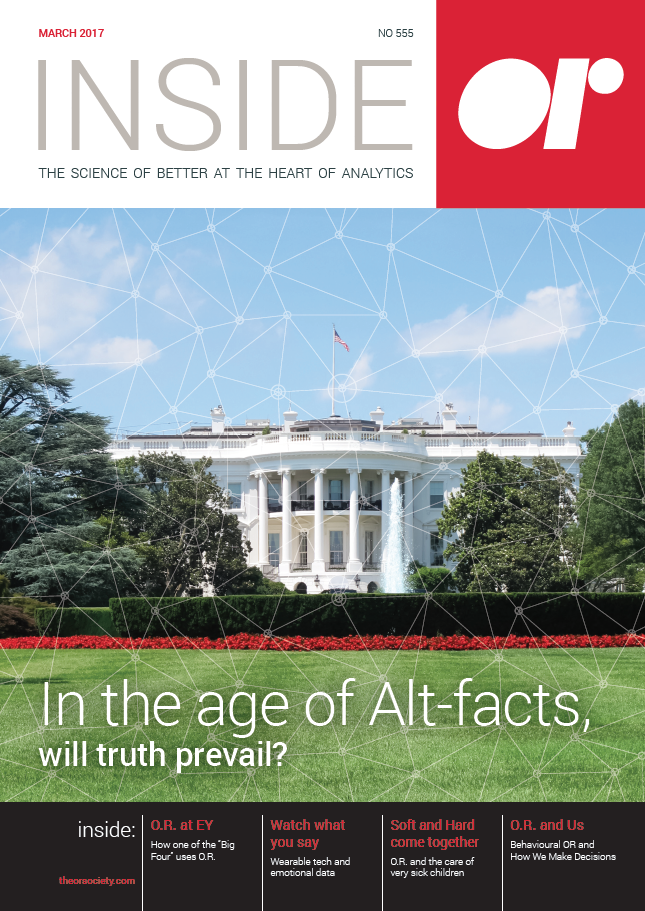This month we ask, in the age of alternative facts, will truth prevail? We look at how one of the 'big four' – EY – uses OR; and we examine how OR impacts the care of very sick children.
Will truth prevail?
RICHARD EGLESE, CHAIR OF THE PUBLICATIONS COMMITTEE
"Social media gives legions of idiots the right to speak when they once only spoke at a bar after a glass of wine, without harming the community. Then they were quickly silenced, but now they have the same right to speak as a Nobel Prize winner. It’s the invasion of the idiots. TV had promoted the village idiot, in relation to which the spectator felt superior. The drama of the Internet is that it has promoted the village idiot to the status of bearer of truth.”
UMBERTO ECO (1932 – 2016)
I came across this quote recently and it led me to reflect on communications in the world in which we live today. Through the internet, it has never been easier to gather information and opinions about every subject under the sun, but it may be harder to distinguish what is reliable from what is false.
The word of the year for 2016 was “post-truth” and at the time of writing this leader, “fake news” and “alternative facts” are topics which are prominent in the media. Anybody who has been involved in OR modelling will recognise that discovering what is really going on in some area under study is not straightforward. Those involved may have different perceptions and the evidence for different claims may not always be easy to collect. The aims of a study may be many and varied and the decision makers may be explicitly or implicitly weighing up one consideration against another. But analysts, as well as decision makers, need to be well-informed, not led astray, and this is where we have to apply some judgement about the reliability of our sources.
The OR Society publishes a great deal of material and a lot of work is undertaken to try to ensure that what we publish is accurate and not misleading. For our academic journals, the editors and referees consider the claims of papers that are submitted. Articles are accepted or rejected or returned for revision depending on the views of people who have not authored the paper and who have some knowledge of the area. Of course, this system is not perfect and occasionally errata need to be published to correct something wrong that has slipped through the net. And reviewers of papers do not always agree.
I was recently asked to provide an additional review for a paper for a journal (not one published by the OR Society) where the first referee thought the paper was great and the second thought that it should be rejected. Nevertheless, this editorial process provides a mechanism to give readers of our journals some indication that articles published have been properly scrutinised and there are at least some others with knowledge of the field who think the article is worth publishing because it represents a worthwhile addition to knowledge and its claims are justified.
The internet has allowed material to be published electronically as well as in print. This has been significant in reducing the time it takes once a paper has been accepted to become available to those eager to benefit from leading-edge research. The internet also allows any of us to publish what we have written on a personal website or blog, but then there are no safeguards against being misinformed by “legions of idiots”.
As well as our academic journals, the Society also publishes other types of material. Inside OR is designed to help members keep up with what is going on in the OR world and our Impact magazine provides case studies and other items of interest that are accessible to a much broader range of readers. For those who are looking for a way to be informed on a particular OR topic, then the OR Essentials book series brings together some of the best research papers from OR Society journals. Several topics have now been covered including emergency planning in healthcare and agent-based modelling and simulation to give just two examples.
I sometimes think that one of The OR Society’s best kept secrets is the fact that every year a book of Keynote Papers is published in conjunction with our annual conference. Those of you who attended OR58 will all have received a pen drive in your conference pack and I hope you found the Keynote Papers for OR58, edited by James Bleach, with a wide range of contributions. Some are extended abstracts designed to support the presentations at the conference, but others are papers that can stand in their own right.
I would hesitate to describe OR Society publications as having "the status of bearer of truth", but I do believe they provide an important source of information to enable us to be reliably informed about the scientific advances and the new applications of OR and analytics.



